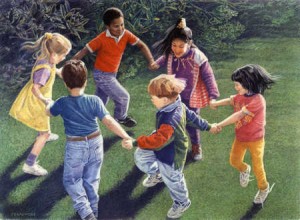All Gifts That Are Given
 The most prevalent mantras I’ve encountered in the “parenting magazine” world have to do with “gifts.”
The most prevalent mantras I’ve encountered in the “parenting magazine” world have to do with “gifts.”
“Gifted children.”
“We need to discover our gifts.”
“Moms need to have their own time to use their own gifts.”
“Time! Talent! Treasure!” (That’s from my “Catholic pew” world.)
“Everyone is special.”
“Allow the child to explore her talents.”
The idea is that your happiness in life is predicated on the identification of your YOU and then your freedom to explore and exploit these gifts to their utmost. This will result in a life “with no regrets,” a “full life.”
This is well and good, but the Philosopher Mom can’t shake the question, “What about after the life fully lived?” It’s a conversation stopper in most playgroups: “What about when the child dies?”
If all those talents are somehow financed and honed so that the child can excel enough to make a living from them, or even leave behind a “classic” for future generations of gifted children, what becomes of the gifted child when her skills grow dull, her mind weakens, and her body fails?
As a mother, I wonder, is there a danger that I am encouraging my child to place her hopes in a false promise? When the glory and energy of life have faded, how will my daughter find herself?
I do not believe that children should be taught to identify themselves solely in their gifts (anymore than we should tell them they are only their faults). The gifts are not an end in themselves; they are not the end-all and be-all of our selves. They are a means to an end and a tool given freely in order that the child might discover her true dignity and worth.
So, if talents and gifts are tools–beautiful tools, but still merely tools–then what is their purpose? Why do we work so hard to leave time for a child to enjoy herself and become good at a certain habit or skill? Why do we train them to do good works, to pray, to give?
The end purpose of all skills, talents, and gifts is quite simple, but almost impossible to find:
It is love.
All gifts will vanish. They are given and they are taken away. Only love and its free reward remains: “Prophecies will end, languages cease and knowledge fail, but love will never cease.” (I Cor. 13.8) A child’s talents and beauty are given for a time for the sole purpose of cleansing her heart and training the eyes of her heart: They exist for a brief moment so that she may behold God forever.
As we parents train our children up in the ways they should go, we must also teach them (and ourselves) that all that we do right now is a means. It is only a looking-forward to the things to come, which will never fail. If I am investing in my child so that she will have a brilliant career, a good living, and a vast array of skills, then my goals for her are short-sighted and beneath her true dignity.
Noticing that gifts–dancing, music, languages, teaching–are for a purpose beyond themselves is not to refuse to enjoy them. When the joy of dancing transforms into the joy of dancing for our Creator, when our dance joins the dance of the stars and all Creation, then the enjoyment of our gift is complete. There is nothing so thrilling for a physicist as the moment–and there may be only one–when his research breaks through time and space and touches the Other Side of the universe. There is nothing so lovely as the artist who has painted the face of a child only to find that her heart has become that Child.
If I help my daughter to grow in goodness and truth and beauty for no other purpose than that she might one day see her Creator and love Him, pure and without stain, then I am truly helping her to realize her gifts and surpass them.

